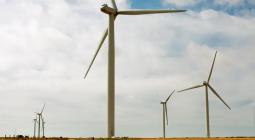Gloucestershire vertical farm is one of UK's 'most advanced'
One of the UK's "most technically advanced" indoor farms has opened in Gloucestershire.
The so-called vertical farm can grow salad three times as fast as traditional outdoor agriculture thanks to its controlled, consistent climate.
Lettuce, basil and other herbs are grown under special lights, in a warm humid atmosphere.
"It's turned farming into a high-tech factory," said head grower, Glyn Stephens.
Mr Stephens has worked in farming all his life, growing every kind of crop.
"This is totally different", he told me, smiling, as he checked through some of the salad harvest.
"There's a lot of tech involved, a lot of engineering involved, and you're inside all day long."
The facility looks more like a warehouse than a farm. Rows of trays, each bursting with basil, lettuce and salad leaves, sit under bright, multi-coloured lights.
Fifteen rows are stacked one above the other, climbing to the roof of the vast building - hence the reason it is called vertical farming.
In all, there is 14,500 square metres of growing space here.
The air is kept at 27 degrees, and around 75% humidity. On the chilly, damp February day I visited, it felt like a spa.
The plants love it, unsurprisingly. Basil grows from seed to harvest in 18 days - "about three times faster than outdoors", Mr Stephens tells me.
What's more, the "outdoors" he refers to is in Spain or Morocco at this time of year.
British supermarkets sell bags of salad leaves all year round, but in the winter they have to be imported.
Mr Stephens insists his crops produce much lower carbon emissions than imports.
He explained: "Compared with trucking the crops across Europe, or even air-freighting it, we are saving carbon."
The farm does use a lot of power, principally on the LED lights which use a scientifically-calculated colour spectrum to stimulate growth.
There is also a lot of ventilation, water circulation, and countless climate control systems.
All the power is sourced from renewable electricity, and carefully managed.
Farms like this are protected from the weather, suffering neither floods nor droughts, and few pests can penetrate the tightly controlled bio-security of the growing shed.
But they rely on huge amounts of electricity, and that has brought other vertical farms tumbling down.
US based Aerofarms was seen as an industry leader until June 2023, when it filed for bankruptcy.
High electricity costs
French firm Agricool went into receivership earlier the same year, Pennsylvania-based Fifth Season shut down in late 2022, Iron Ox of California has laid off nearly half its workforce and Infarm has closed its operations in Europe - making 500 staff redundant.
Tellingly, Infarm blamed high electricity prices in Europe, saying the company had "decided to shift its geographical focus from Europe to high-potential regions better suited for indoor farming, with low energy prices".
James Lloyd-Jones, the founder and chief executive of Jones Food Company, said the new unit in Gloucestershire is more efficient, and will survive better than the others.
They sell their salad bags for £1.25, about the same as their competitors. Fine tuning the climate-control should keep energy use as low as possible.
Mr Lloyd-Jones said he believed his company had "cracked the code" for growing sustainable food all year round.
"Commercial success has been the challenge in this industry, but we have now cracked it," he said.
Cover photo: The growing space covers 15 layers from the floor to the ceiling




